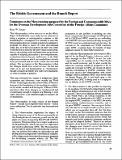| dc.contributor.author | Singer, Hans W. | en |
| dc.date.accessioned | 2016-04-08T09:44:35Z | |
| dc.date.available | 2016-04-08T09:44:35Z | |
| dc.date.issued | 01/04/1981 | en |
| dc.identifier.citation | Singer, H., W. (1981) The British Government and the Brandt Report. The IDS Bulletin 12(2): 39-41 | en |
| dc.identifier.issn | 1759-5436 | en |
| dc.identifier.uri | https://opendocs.ids.ac.uk/opendocs/handle/20.500.12413/10734 | |
| dc.description.abstract | Summary The British Government's unimaginative response to the Brandt Report reflects the official view that no new ideas are needed in the field of overseas development. But the FCO Memorandum correctly points out the central weaknesses of the Report: it is much too timid in addressing the OPEC countries and mistaken in using a simplistic North?South categorisation. The apparent agreement with the Report on the importance of ‘mutual interests’ conceals a different interpretation of the concept. There are inconsistencies in the Government's policy as it affects access to Northern markets for poor countries' exports; and the Government cannot argue that the North is presently the motor of growth for the world economy. It fails to take the point that the real cost of resource transfers is relatively low in recession. Resume Le gouvernement britannique et le rapport Brandt La réaction dénuée d'imagination du gouvernement britannique au rapport Brandt correspond aux vues officielles selon lesquelles il n'est pas besoin d'idées nouvelles en matière de développement. Le Mémorandum du FCO souligne à juste titre le point faible du rapport: son appel aux pays de l'OPEP n'est pas suffisamment pressant et il opère une distinction trop simpliste entre Nord et Sud. L'approbation apparente de la notion des “intérêts communs” dissimule en fait une interprétation très différente de cette idée. On observe une certaine incohérence dans la politique des pouvoirs publics en matière d'accès aux marchés du Nord pour les exportations des pays pauvres. Le gouvernement ne peut par ailleurs soutenir à l'heure actuelle que le Nord est un moteur de l'économie mondiale. Il néglige l'argument selon lequel le coût réel des transferts de ressources est relativement faible en temps de récession. Resumen El Gobierno británico y el Informe Brandt La respuesta sin imaginación del Gobierno británico al Informe Brandt refleja la opinión oficial de que no se necesitan nuevas ideas en la esfera del desarrollo exterior, pero la Memoria de la Oficina de Asuntos Exteriores y del Commonwealth pone justamente de relieve las debilidades centrales del Informe: es demasiado tímido cuando se dirige a los países de la OPEP y está equivocado al utilizar unas categorías demasiado simples en cuanto a norte y sur. El acuerdo aparente con el Informe sobre la importancia de los ‘intereses mutuos’ esconde una interpretación distinta del concepto. Hay inconsistencias en la política del Gobierno en lo que se refiere al acceso para las exportaciones de los países pobres a los mercados nórdicos, y el Gobierno apenas puede insistir en que el norte sea actualmente el motor de desarrollo de la economía mundial. Fracasa en su intento de poner de relieve que el costo real de la transferencia de recursos es relativamente bajo en una época de recesión. | en |
| dc.format.extent | 3 | en |
| dc.publisher | Institute of Development Studies | en |
| dc.relation.ispartofseries | The IDS Bulletin Vol. 12 Nos. 2 | en |
| dc.rights.uri | http://www.ids.ac.uk/files/dmfile/IDSOpenDocsStandardTermsOfUse.pdf | en |
| dc.title | The British Government and the Brandt Report | en |
| dc.type | Article | en |
| dc.rights.holder | © 1981 Institue of Development Studies | en |
| dc.identifier.doi | 10.1111/j.1759-5436.1981.mp12002011.x | en |

